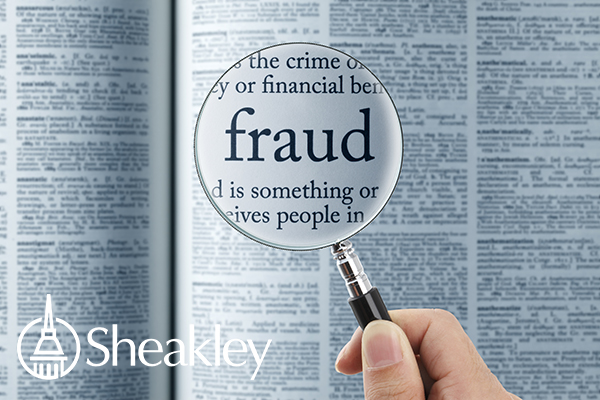Reading time 5 Mins
Published on May 29
Share
Watch out for the warning signs of potential fraud
Workers’ compensation fraud is a drain on the system that can result in stiff penalties, fines, or civil liability. Workers’ Compensation Insurance exists to provide a safety net for injured workers and their employers. While injury prevention is a key component of the BWC, when injuries do occur, workers’ compensation coverage exists to provide financial and medical assistance to the injured workers and their speedy recovery which will allow them to return to work and regular activity. When the system is abused by fraudulent claims or activity, all workers within the system are hurt.
What is Workers’ Compensation Fraud
Workers’ compensation fraud comes in a variety of forms and can be perpetrated by employers, employers, and healthcare providers. Fraudulent workers’ compensation claims cost the industry and the states billions of dollars every year.
Workers’ compensation fraud occurs when someone knowingly and willfully makes a false claim or withholds information in order to receive workers’ compensation benefits or prevents someone from receiving benefits to which they might be entitled. Below are a just few examples of how workers’ compensation fraud can be committed.
Claimant Fraud
Claimant fraud occurs when an employee makes a fraudulent workers’ compensation claim. While employees may see this action as no-harm no-foul, these claims can make it more difficult for true claims to be approved in the future.
Claimant fraud can be perpetrated in a number of ways, including:
- Claiming a non-work related injury as a work-related injury
- Claiming a job-related injury that never occurred
- Working while allegedly disabled and not reporting income
- Exaggerating the symptoms or condition of an injury
- Falsifying mileage reports
Some red flags that may indicate claimant fraud activity include:
- Claimant is a seasonal worker whose work is about to end when they file a claim.
- Claimant has extremely limited availability for exams or appointments or is rarely available to answer calls at home.
- Claimant collects BWC total disability compensation while continuing to work.
- Claimant engages in physical activities that are inconsistent with the limitations caused by the injury they have claimed.
- Claimant engages in the illegal exchange or sale of prescribed narcotic medications or purposefully deceives healthcare workers to obtain more than one prescription for the same medication.
Employer Fraud
While claimant fraud may be the first to come to mind when a person hears the phrase worker’s compensation fraud, employers are often the perpetrators of such activities as well. Employers are committing workers’ compensation fraud when:
- Employer deducts premium dollars from employee’s wages.
- Employer under reports employee payroll for lower insurance premiums.
- Employer misclassifies employers for lower insurance premiums.
- Employer willfully neglects to obtain or maintain necessary workers’ compensation coverage.
Some red flags that may indicate employer fraud activity include:
- BWC coverage certificate is not visible or has an outdated coverage period.
- Employer misclassifies employees as independent contractors or subcontractors to avoid including their wages in payroll totals.
- Employer knowingly misreports payroll totals or purposefully shifts payroll to lower cost jobs in an attempt to lower insurance premiums.
Medical or Health Care Provider Fraud
Workers and employers turn to healthcare providers when an injury occurs and trusts that their treatment and diagnosis will be in the employees’ best interest. Medical or health care provider fraud constitutes not only a violation of the rules put in place by the BWC, but also of the trust of workers and employers. Medical or healthcare provider fraud occurs when:
- Provider bills for services or treatments that were never performed.
- Provider conducts medically unnecessary testing or treatment for financial gains.
- Provider double bills workers’ compensation insurer and the workers’ own health insurer for the same services.
Some red flags that may indicate employer fraud activity include:
- Provider relies predominately on the prescription of narcotics, rather than medical treatments.
- Provider performs unnecessary treatments or tests.
- Provider is unlicensed at time of billing for services.
- Provider bills for unprovided services or for services more expensive than those that were actually performed.
Reporting Fraud
The Ohio BWC relies heavily on members of the public, including workers, employers, and medical providers, to report suspected fraud. Agent from the BWC special investigations department will gather information, conduct a thorough review of the case, and analyze the data to determine if fraud has been committed. In reporting fraud, whistleblowers need only suspect that fraud has been committed.
The Ohio Bureau of Worker’s Compensation offers an anonymous online Fraud Allegation Form for those wishing to report suspected fraud. When reporting suspected fraud, the BWC asks that reporters please provide as much information as possible, including:
- Name and address of person being reporting;
- Details about the suspected improper or fraudulent activity;
- Other general information pertaining to the suspected fraudulent activity.
This information allows the BWC to conduct an investigation that is thorough, fair and objective.
Your partners in identifying and preventing potential fraud
Your workers’ compensation insurance policy protects your company and your employees. The Ohio BWC and your MCO can help you identify and prevent potential fraud activities.
Stay up-to-date on all things Sheakley by subscribing to our blog and following us on social media. Join in the discussion by commenting below.




